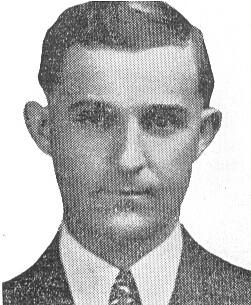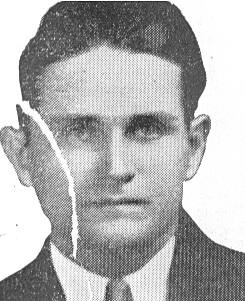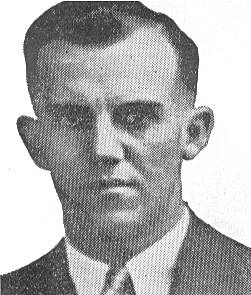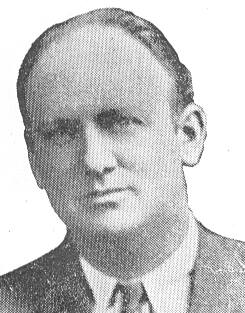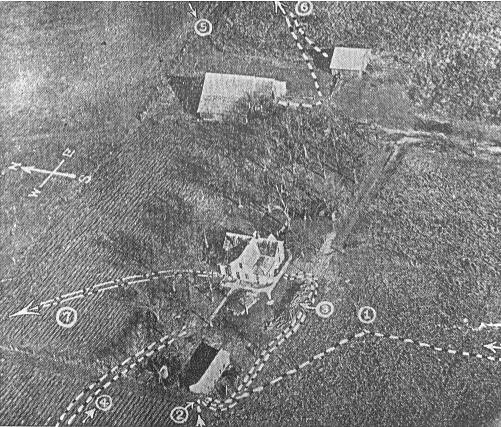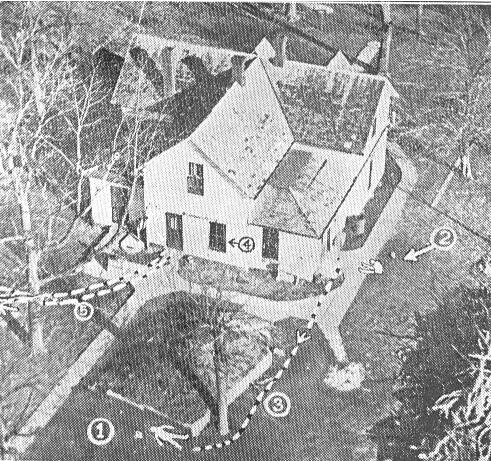| CHAPTER IV
RESCUE OF THE DEAD
The drama of the rescue of the dead and dying men who lay on the cold, damp ground at the Young farm house, is a sad commentary on the lack of preparation in law enforcement circles everywhere, for such emergencies. The drama started when Detective Virgil Johnson with bird shot in his person, driving a car with shattered glass, tipped around the corner at the Young farm lane, to speed away with his companion for Springfield and more help.
In a second, not much more, hell was loose. Men grabbed their guns and jumped into cars. Virgil Johnson, with more gas shell , took the wheel of his car and yelled, "Let's go. Let's go." Detective, Ben Bilyeu, Detective Lee Jones, Detective Sidney Kemp, and Motorcycle Officer Cecil McBride scrambled in and they were off. Otto Herrick, automobile dealer, heard the cry and ran for his car. With a companion named Van Hook, he sped away. Motorcycle Officer Waite Phillips ran for his sedan, and with Sam Herrick, Jr., a motor dealer also, Detective Grover White, Roscoe Gaylor, a Deputy Constable, and Lon Scott, former Secretary of the U. S. 66 Highway Association, but recently Adverting Counsel for the Missouri Farmers Association, all of whom except the others were passing by, made haste to bear down upon the scene of death. Motorcycle Officer Lester Scott, jumped astride his motorbike and followed. Detective Johnson turned around and came back to the station for some ammunition he remembered was stored in a locker, but he left again like lightning and he was followed in short order by other cars with more officers and civilians, and they were followed in due time by hundreds of autos bearing citizens mad and thirsty for the blood of guilty killers. Someone 'phoned the Springfield Evening Press. Someone 'phoned the Springfield Evening Leader. They rushed cameramen and reporters to the front, and got their wires hot to tell the world. From everywhere in the central west, Federal and State Officers and Railroad Detectives rushed by airplane and auto to Springfield. Chief of the Springfield Police, Ed Waddle, barked orders and asked for help to set the Missouri State Police, the National Guard, and other law enforcement agencies at work to form a dragnet that would bring every guilty man to law. But, out at the Young farm home all was wrong. In broad daylight Sheriff Marcell Hendrix and Tony Oliver, known to police circles everywhere, and Officers Sid Meadows, Ollie Crosswhite, Wiley Mashburn and Charles Houser, all loved by thousands, lay dead and dying, while men ranted and raved close to them, but stayed too far away. Motor dealer, Otto Herrick, and his companion, were first to reach the Young farm. As they sped south from the U. S. 66 Highway, they were hailed down by Detective Owen Brown and Frank Pike who were standing on the road which is a safe distance straight east of the Young buildings. Herrick had hardly alighted when Detective Virgil Johnson scooped down with his carload of officers.
Someone said, "Well boys, what will we do?" Another replied, "Well, let's go down to the entrance of the lane south of the house." Forthwith, some rode and some walked to the lane entrance south of the Young buildings. No one had any plan to work, none had authority to enforce orders. The rescuers all felt that without an armored car, without steel vests, or bullet proof shields, they must somehow retrieve the dead and dying men under fire of the killers' guns. After some mulling about, Lon Scott climbed a wire fence and slowly, carefully made his way up the incline through corn stalks toward the house. At the crest of the hill in a crouched position he looked upon the Young brothers' fort. At this considerable distance, he could plainly see a car in the barn, a shed nearby, the trees in the yard, the house, a polepile south of the kitchen door, and a chicken house to the west and rear. He gazed intently for sometime and saw that none of the windows on the south side of the house were broken, nor were any of them raised. The kitchen door was open, a car stood among the trees, but no one moved or strolled about that he could see, nor did he hear, at that long distance, any sound. He stood erect and walked about among the stalks to determine whether or not a rescuer might draw fire. Not being fired upon, he went some farther toward the house and walked about erect again, plain to view from either the house or barn. No rifle cracked, no shotgun banged, lie drew no fire, nor did he sec a moving thing or hear any sound. He returned quickly to the road. By that time Constable Scott Curtis, one ambulance, a host of cars, and a legion of armed citizens had gathered on the road near the south lane gate.
"Alright," Detective Jones agreed, "let's go, but you'd better have a gun." A farmer handed Scott a high-powered rifle and swung a bandolier of ammunition over his shoulder. They climbed a fence and started off. "Wait a minute," Detective Grover White advised, " me and Roscoe Gaylor are going too." These four started north close together, considerable to the west of the lane south of the house. When they reached midway of the corn field Detective Lee Jones advised the other three, "we'd better not stay too close together. Scott you go straight up and I'll go to your left, and Gaylor you try to get around from the west, and White you attempt to come in from the northwest." Separated, these men advanced slowly and in a crouched position toward the Young farm yard. As those on the left, walked up the hill, Motorcycle Officer Cecil McBride followed by motor dealer, Otto Herrick, and then in a short distance by the latter's brother, Sam Herrick, Jr., started up the grade toward the barn to the right of the south lane. As McBride and the Herrick brothers got well up in the field, they saw a man, large in size, standing beside the car on the barn floor. Both McBride and Sam Herrick, Jr., came up with rifles and fired. Their target dashed around in front of the car and disappeared again within the barn. "What are you shooting at?" Otto Herrick inquired. "Hell, man," McBride yelled back, "didn't you see that man in a long black overcoat?" "I didn't see anybody," Otto advised. But his brother Sam said, "I sure as hell did, and I think I pumped him too." On the left of the lane Scott, Jones, Gaylor and White were going slowly and carefully in crouched positions toward their goal. They then separated enough and walking so low they could not see each other, nor did they speak or yell back and forth. In the field to the right. Officer McBride and his two companions were now close to the hay stack south and east of the barn lot. They now detoured somewhat to the east and slowly and carefully picked their way to a destination they decided would be back and east of the barn. They saw no one else, nor did they hear any sound. Further on they went until they were even to and east of the shed. There, they waited a moment to listen and look, but they heard nothing, nor did they see any movement of a human being. On they went again and soon they reached an embankment north and east of the big barn, at the edge of the cornfield. Behind them lay a pasture field and to the east some scattering trees. On the west, Scott, Jones, Gaylor and White were creeping up wondering every moment when the shooting would begin. Scott finally reached a place in the field where stalks were short and somewhat few that, he figured, would expose him full to view. He decided then he would be just as safe at the pole pile at the south of the kitchen as anywhere farther away. Taking grip of his rifle and arranging his bandolier, he made ready and dashed like a football half-back plunging a line toward the pile of poles. When sixty feet away, he stepped on his overcoat and sprawled full-length upon his face where he lay. In time, his breath came back, his ears cleared up and then he heard a funny sound, "ummm," which was hoarse enough to portray the voice of an aged man. Scott realized now that he was in the presence of someone alive. He waited, he listened. Again he heard that "ummm," and then again and again. He felt for certain now he was being covered by someone at the pole pile, so he put the rifle to his shoulder to answer any fire. No one moved, no one talked, but that "ummm" and "ummm' continued. The ex-soldier reasoned that whosoever had him spotted must not bear a rifle, else he would have cracked down long before. Down at the embankment behind the barn, McBride and the Herricks were listening and looking for any movement. They were rewarded. "Look," McBride whispered, "a dog." "You're right," said Sam, "he came out of that stable door. There he goes in that shed." "Look, look," Otto Herrick nudged the officer, "there's another," and McBride said, "he's going in the shed, too. Well I'll be jiggered. Do you reckon that guy we popped in the barn has got down there." "Lay quiet," Sam Herrick advised, "if he shows we'll blow him full of holes. Get your guns ready." They whispered among themselves and watched. In a few minutes they heard a whistle, low and soft. "What's that?" one of the Herricks wanted to know. "Keep still, listen," said McBride. Again they heard the whistle, this time it was louder and longer. Someone in the barn was calling the dogs. The dogs came out of the shed and went straight into the stable door. "Well, I'll be blowed. That guy never left the barn," the officer said. But soon the larger dog came out again and went to the shed. "Man, listen," said Sam Herrick, "there's two guys, one in each place." "You must be right, Sam," his brother added. "Those dogs wouldn't be playing back and forth if there wasn't men in both places." ,, "Boys, get ready for action," McBride ordered, "them birds may show their face and when they do they'll think hell broke loose. In a minute or two the larger dog went back through the stable door, end then again while they looked and listened they saw both dogs come out and go to the shed. McBride had hardly said, "keep quiet now, and listen," when they heard a muffled voice within the barn say, "Where are the other two bodies?" '"Did you hear that?" snapped McBride. "I did," said Sam. "He asked where the other two bodies were." "That's what I thought," McBride answered. "What does he mean?" "Don't know. Do you reckon he means Pike and Brown, or are some of our boys dead in the barn?" "No, they ain't dead in the barn. Brown said they're up in the front of the house on the ground." "Well, who do you think it is in the barn and shed?" "One thing sure, it ain't any of our boys so we'll shoot anybody that shows his face." "Hel yes," Otto Herrick added in a whisper, "I'd shot Santa Claus now if he stuck his head out of one of them doors." Again McBride cautioned the others, "Be quiet. Listen." Just then they heard a door slide. One of the Herricks saw a hand a part of an arm. He let go, BANG. "What in the hell did you do that for?" McBride remonstrated. "Damn it, didn't you see that man try to get out of the door?" "No, I didn't see him, but I heard the door. It's wider than it was ain'tit? He can get out now." "Shush, shss," whispered Sam Herrick. "What is that? It's somebody in the stalks. Hear them break? Hear their feet? Over there by the shed." "Keep quiet," McBride ordered, and then in a second he said, "you're right. It's over there by the shed. My God, how are we going to watch all the places?" One of the Herricks raised up a bit and looked, "I can't see anybody. Maybe they're laying down. Maybe, they came out of the other end of the shed and went back. What are we going to do?" "Hell boys," McBride spoke in a low voice, "we can't keep track of a whole army, just us three. We got to do something and damn quick, too." "Well, what'll we do?" One of the Henrricks asked. "I'll tell ya," McBride whispered, "you two work back through the stalks to that open field and then to where the rest of the bunch is and tell them to send a gang up there quick. I'll slip down farther near those trees so I can see better over in the stalks. I'd still have just as good a view of the barn as we got now." The Herricks agreed, and together all three crept down some farther east to where McBride had protection both from the embankment and a tree and then he stopped. They continued on in a circuitous route through the stalks, slowly and carefully, keeping low. The sun was setting in the west, but it was a light enough to see. Down at the lane entrance all was talk and noise. All of the ambulances in town had come and the road was lined with cars as far as one could see. Every minute another city or county officer arrived to bring tidings that the Missouri National Guard were on the way with machine guns, that the Springfield Press had an extra out, that the Sprigfield Leader had one too, with pictures in it. The Missouri State Police had officers there and from every county round about came officers and officials. Constable Scott Curtis tried to bring silence in that pandemonium, but there were a thousand jabbering voices and engines were running and men were stamping as they ran on the road and caled back and forth. He did succeed in getting the ambulances around some cars and headed toward the house inside the gate before th sun went down enogh to bring on the dark. Up near the house, on the west side of the lane, Detective Grover White had worked around carfully to a position north and west of the yard. Roscoe Gaylor was filling in to the west. Detective Lee Jones had crept up south and west of the poultry house. Lon Scott still lay on his stomach near the pole pile trying to fasten his eyes upon the man who kept saying, "uhmmm" and he watched the windows and he watched the poles. He saw not a soul, not even a dog, nor did he hear a single sound except that hoarse sound, "ummm" as someone cleared his throat. Finally, deciding he must be covered with a shot gun or revolver and knowing it wouldn't do to run for other cover, he figured he wouldn't be any worse off laying prone like he was with his rifle cocked, if he talked. So, he spoke in a low tone, "Hey." Nothing happened. He saw no move, nor heard any sound, except that "uhmmm". He waited and listened. That "ummm" continued. "Maybe he didn't hear," Scott thought. "Hey," he spoke again, this time louder but still soft. All was quiet yet. No one moved. No one spoke, except the man who cleared his throat, "ummm." He waited, but now he raised a little on his elbows to peer about. All was corn stalks to his right and left and back, even in the front between the pole pile. "Well" he thought "'it can't be anybody but old man Young. He's on the other side of the pile. He's just as frightened as anybody. If I rush him while he's watching me, he won't get more than one shot before I make cover and then we'll be even if he don't hit me on the way. Anyway he may be in that open door." He planned to dash for the poles and drew his feet and knees up to spring when he heard a dull thud or whack. He lay down then nonplussed. For certain now, he knew he was covered. Old man Young was getting a better foothold on the poles-that's what made the noise. He flattened out complete and put the rifle stock before his forehead to ward off any well-aimed bullet. There he lay and listened in ample light to see but he saw nothing move and heard nothing but that continuous "uhmmm". He heard a rifle crack around the barn and that eased his mind. For the first time he thought of Lee Jones. Where was Lee Jones? Nothing worse could happen if he yelled for Lee Jones. He would yell for Lee Jones. He rolled over some on his right side and let out a lusty, "Hey, Lee'" "Is that you, Scott? Where are ya?" Jones barked back at once. "I'm near the pole pile. Where are you?" Scott shouted. "I'm west of ya, out in the stalks," and then he added, "Can ya hear or see anything?" "A man's got me covered at the poles." "The hell he has. What'll we do? Shall I come up?" "No, let's run for the chicken house." "Anybody in it?" "No." "Alright, let's go." When Scott slid around the end of the poultry house, Jones was erect looking inside through cracks. "There's nobody in there," he said. "I wonder where the hell everybody is? Did you hear or see anybody? I know I ain't, but I ain't been standing up any." "A man had me covered at the pole pile," Scott put in. "You mean, you saw him with a gun."
Air view of Young farm yard showing (1) where Lon Scott fell in cornfield. He dashed to poultry house (2) where he met Detective Lee Jones. Together they ran to pole pile (3) and later to kitchen door. Detective White and Gaylor arrived from west (4) to help call ambulances. Motorcycle Officer McBride left his first post at (5) to get farther east to fire on two men who started through cornfield at (6). The killers are presumed to have taken route (7) to temporary freedom. "No, I never saw him at all, but I heard him clear his throat just as plain as day." "Did he say anything?" Jones asked. "No, he just kept clearing his throat." "Was he outside?" "I think so, maybe we can peek around and see." "Don't do any peeking yet. We might get our heads blowed off, What do you think we'd better do? Are you sure you heard somebody?" "Of course. It's an old man. It's old man Young. I could tell by his voice." "You're crazy, Jones, put in. "Old man Young's been dead for years. Maybe its some of our boys." "No, it isn't. I yelled at him and he didn't answer." "Was that you? I thought I heard somebody holler "hey," but I couldn't place it. What arc we going to do?" "There's only one thing we can do. That's to get to that pole pile so we can see something before it gets too dark." "Alright, that's damn funny business, but if there's only one man down there, we'll be better off than he is. We can't do anything here anyway. How'11 we make the run?" "I'll go first. I know the lay better than you do, but I'd better have that shot gun." "Alright take it. There's just one shell in it and that's all I got. Let me have your rifle. How do you work this thing?" "Just like any rifle, Scott suggested. "It's all ready to go. All you have to do is pull the trigger." We'd better be sure. I'll try it," and Jones raised the rifle to his shoulder and pulled the trigger. It didn't work. He pulled again. The same result. Scott said, "Let me have that damn thing," and he pulled the bolt back, rammed it home, saw that it was off "safety" and pulled the trigger. "Hell," he scowled, "its broke. The trigger's broke." "That's a damn fine gun to have in a place like this. Now what are we going to do? Thank God, I've still got my pistol." The light was beginning to fade fast, and Jones and Scott decided to make the dash without further delay. Without peeking first, they made it, around the chicken fence and straight-a-way for the poles. Jones slid in ahead though Scott had started first. They got their breath and listened. They heard that "uhmm." "What is that?" Jones whispered. "That's the man I was telling you about." "Where is he?" Scott indicated with his finger, through the pole pile. Jones tugged Scott's sleeve and together they silently crawled to the east end of the pile where through holes they saw a man sitting up erect, his back to them, his overcoat collar up, hat off, near the kitchen door, and he was moving his left arm. Then he began to rock, forward and slowly back. He said, "uhmm." "That's one of our boys," Jones whispered. "No it isn't," Scott objected. "Neither Sid, Tony, nor Ollie have red hair and he's too big for Charlie." "By God, he's wounded anyway. We've got to do something. What'll we do?" "We've got good cover now, let's yell for the ambulances." "Go ahead while I watch things with my gun." Scott slid around to face the rear and let out a lusty "warhoop." No answer. Then another still louder. This time an answer came from east of the barn. "Wasn't that McBride?" Jones inquired. "Yes," Scott replied. "But nobody else hears us." "There's too much noise down at the road. Holler louder so they can hear." Next time Scott yelled with all his might. Someone part way up the lane yelled back. Then Scott shouted, "come on up. Come on up." "Go to hell," a voice came back. (Probably they thought it was some of the Youngs). Continual yelling brought responses from Detective White and Gaylor, west of the house, and McBride, again down east of the barn. Gaylor ran toward the lane entrance to repeat the shouts, "Come up. Come up. Bring the ambulances." But with the noise in the lane, none could heal. No one started for the house. In desperation. Detective Jones said, "Damn it, Scott, that man is dying. We've got to do something." Scott said, "What will we do, shall we go to him?" And Jones said, "Yes, we'd better. Give me the shot gun, and I'll dash to the door while you see who it is." Together in a crouched position they jumped from around the pile of poles and rushed to the wounded man. Jones stuck the muzzle of his gun inside the door, and over his shoulder he said, "Who is it?" Scott grabbed the dying man by the head and pulled it back and said, "I don't know." Jones looked over his shoulder and said, "My God, its Wiley Mashburn." Just then, Deputy Sheriff Wiley Mashburn moved his left arm up in front of his face and dragged his bloody fingers through the wound. Jones and Scott saw the most ghastly sight it had ever been their experience to look upon. It seemed as though some one had taken a long heavy knife and cut Mashburn's head along the brow deep into his skull and peeled it down. His eyes and nose were hanging down over his mouth and chin. Jones turned around flabbergasted, with his foot and head and gun barrel in the door. Scott grew sick and slumped against the wall. They remained in these postures for seeming eternity. Jones came to his senses and said, "Scott, there's a fire in the stove." Jones waited. In a moment he added, "My God, there's a dead man on the floor, and then he turned, evidently to see why Scott hadn't answered. Again, he saw Wiley Mashburn run his fingers through the wound and this made him wild. He turned on Scott, "Damn you, Scott, do something. Pick him up. Get him out of here. He's dying. Do something. Damn it. Pick him up, don't stand there. Lift him up." Stampeded, Scott stepped over and tugged with all his might at Mashburn from behind. But the dying man was heavy, or Scott was weak.
Rescuers found Deputy Crosswhite (1) behind the cellar. Deputy Mashburn was sitting erect at (2). One of the killers is presumed to have taken route (3) to reach Crosswhite while other killer fired at him from dining room window (4). It is thought killers used rear door and route (5) to escape.
He didn't budge an inch, and Scott realized it would be impossible and useless to pick the Deputy up and hold him until the ambulance came. Noticing Scott's half-hearted attempt, Jones ranted and raved, "What in the hell is the matter with you? Pick that man up. Are you going to let him die right here? Do something. Damn you. Don't stand there like a statue. Lift him up. Take him away. Drag him to the ambulances while I watch the door." Scott answered back, "Lee, I can't lift him. I can't even drag him. He's too heavy. Let him set on the ground. He's better off. What are we going to do?" Jones barked, "Do anything, you damned fool. Get those ambulances up here. Drag him over the hill where they are. That man's dying. I'm telling you he can't last long now. Holler for those ambulances. If you can't do anything else, holler, holler loud. Get 'em up here." Scott stepped out in the open and with both hands to his mouth, he yelled again with all his might, but got no reply. He turned to Jones and said, They don't hear us. Lee. Come and help me yell." Jones stepped back from the kitchen door and together they both gave one lusty "warhoop' after another over the stalks to where the group were milling about. Gaylor by this time had reached the point where he could help repeat the call, which he did, and then some lights showed above the crest. The crowd was coming. In a mad dash everyone that could come afoot or in an auto poured into the Young farm yard. Among the first to reach the scene were Constable Scott Curtis and his son Howard; Sam and Otto Herrick, who had been unsuccessful in getting anyone to go with them to McBride. A farmer in the Young neighborhood, Bun Barrett, and Ralph Langston, a contractor; and a Leader reporter, Frank Rhoades; a Press reporter, Erwin Greenhaw; Motorcycle Officers Waite Phillips and Lester Scott, were among the score others who were first to brave danger to ride in or run beside the Police Patrol and ambulances. The first to penetrate the yard in the head lights of the car shouted, "There's Tony Oliver, here's Charlie Houser, there's Sid Meadows." When he backed around with his lights shining upon the barn, ambulance driver Lewis Canady and several others saw a man run down the ramp, vault a gate between the shed and disappear. At the kitchen door, stood Lee Jones with his gun muzzle pointed inside, and Lon Scott with his hand on the bloody head of Deputy Mashburn. Scott yelled and pleaded, "bring an ambulance. Bring an ambulance. We've got a wounded man here." Someone heard and saw his figure in the reflection from auto headlights, and shouted, "There's a man. There's a man. Shoot him!" Three guns were leveled down on the body of Scott who had not been able yet to make himself understood. The reporter, Frank Rhoades, recognized him and cried, "Don't shoot. Don't shoot. That's Scott." Motorcycle Officer "Waite Phillips vaulted the front-yard fence and ran to Scott and Jones to help them carry Mashburn to the crowd. While Lee Jones covered them with his gun, Phillips and Scott dragged the wounded man backward to the fence and with the aid of others hoisted him upon the wire. Two or three came forward in, the light to take him down, but saw his ghastly wound and jumped back, pale and frightened. Jones yelled and cursed, "Damn you, men, don't stand back. Grab a hold and take this man. He isn't dead, he's dying. Take him quick. Come on, come on. Damn you, grab a hold!" Others came who lifted the Deputy to a cot and pushed him then inside. Detective Lee Jones shouted in the turmoil, "There's a dead man in the back of the house where the kitchen door is open. Come and help. We'll bring him out," but many were running for the porch in front. When they trod upon it, a dog ran out and disappeared in the dark. Constable Scott Curtis and a score of others, broke through the front door and made their way to the back where they found Sheriff Hendrix in a crimson pool, his head and arm braced against a chair. Constable Curtis, and his son Howard, carried the dead Sheriff through the open kitchen door where others came to help bear him away. Detective Jones, Scott, and others behind the house found the sprawling form of Deputy Ollie Crosswhite. One ambulance rushed away with four bodies pushed in helter-skelter fashion for town. Another sped away with one dead man, a third shrieked for right-a-way with the wounded Deputy Sheriff, who talked some on the dashing trip to town, "The boys got me. I guess we didn't do any good out there." At the hospital he stood up while attendants tore his clothes away. "Tell my wife to come," he sobbed. "I guess they got me. It's dark. I can't see. At 8 o'clock, what feeble spark of life remained within his throbbing heart, grew dim and dimmer, it faded out complete. He died four hours almost to the minute from the time he stepped back blinded and hurt at the kitchen door of the Young farm house. A few seconds after the ambulance left shrieking down the lane, Motorcycle Officer Cecil McBride heard cornstalks popping to his front and left. He waited. Someone was coming near. He leaned forward to pierce the dark. Two men showed and in the middle a dog. One man was hatless, medium sized and thin. The other was shorter with an overcoat and hat. The dog ran ahead toward McBride and when he stirred to raise his gun the cur barked and jumped back while he growled. Both men stopped short and scooted down to turn around and run. "Stop," McBride shouted, "who are you?" But they leaped and ran. He fired BANG and BANG. One fell down and yelled, "My God," the other knelt and aimed his gun and fired several shots at the officer, who ducked his head. When McBride raised up again they were running for the barn. The dog was not around but he could see the men till they reached the shed. As fast as he could, he hurried to the yard for a posse to search the barnlot but none would go. Some were busy trying to fire the house and others were rushing to put it out. Scores were standing around.
Police Equipment Our Equipment Includes Tear Gas Shells, Tear Gas Guns, Riot Guns, Gas Grenades, Gas Bombs, Shotgun Shells, Revolver Shells, Smoke Screen Shells, Star Shells, Sickening Gas Shells, Flares, Police Club Guns, Fountain Pen Guns, Etc. And we manufacture special equipment for Banks, Stores, Safes, Vaults, Money Drawers, Messenger Bags, and Industrial Payroll offices. We are the oldest and largest manufacturers of Tear Gas Equipment in America. WRITE FOR INFORMATION FEDERAL LABORATORIES, Inc. 185 Forty-First St. Pittsburgh, Pennsylvania. (special thanks to Captain Jim Barber of the Greene County Sheriff's Department who sent me the two pages of this chapter I was missing) |
||||||||||
|
